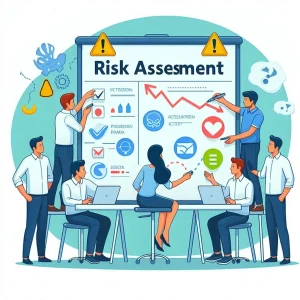In the realm of internal audit, the Certified Management Accountant (CMA) certification stands as a prestigious credential that signifies a professional’s expertise in financial management and strategic decision-making. However, understanding the CMA exam cost is crucial for those considering pursuing this certification. The CMA certification is particularly significant for internal auditors, as it equips them with essential skills in financial analysis, risk management, and performance evaluation, which are critical in today’s complex business environments. As organizations increasingly seek professionals who can provide insights into financial performance and operational efficiency, the demand for CMAs in internal audit roles continues to grow.
The job market for internal auditors is notably competitive, driven by the need for organizations to enhance their governance, risk management, and compliance frameworks. With the rise of regulatory requirements and the increasing complexity of financial operations, companies are on the lookout for qualified candidates who can navigate these challenges effectively. This heightened demand creates a landscape where job seekers must differentiate themselves through relevant certifications, such as the CMA, to enhance their employability and career prospects.
However, aspiring internal auditors must also consider the financial implications of obtaining the CMA certification. The costs associated with the CMA exam, including registration fees, membership dues, and study materials, can be substantial. This raises an important question: how do these costs align with the job market demands for internal auditors? Understanding the relationship between CMA exam costs and the competitive landscape of the internal audit profession is crucial for job seekers and career planners. It not only informs their decision-making process regarding certification but also highlights the potential return on investment in terms of career advancement and salary prospects.
Understanding CMA Certification
The Certified Management Accountant (CMA) certification is a prestigious credential that signifies expertise in financial management and strategic decision-making. For professionals in the internal audit field, obtaining this certification can be a significant asset, especially in a competitive job market. Here’s an overview of the CMA certification process, its benefits for career advancement in internal audit, and the key skills and knowledge areas it covers.
Overview of the CMA Certification Process
The CMA certification process involves several steps that require both financial investment and commitment. Candidates must first pay an entrance fee, which covers application processing, exam registration, and access to CMA exam content. Following this, candidates must pass two parts of the CMA exam within three years. Each part has its own exam fee, which is $460 for professional members and $345 for students and academic members [1][5][12].
In total, the costs associated with the CMA certification can range from approximately $787.50 for students to around $1,109.50 for professionals, depending on membership status and additional expenses such as study materials [7][13]. Furthermore, maintaining the CMA designation requires ongoing membership in the Institute of Management Accountants (IMA), which incurs an annual fee of $245, along with a requirement to complete 30 hours of continuing education each year [8].
Benefits of Obtaining CMA Certification for Career Advancement in Internal Audit
The CMA certification offers numerous benefits that can enhance career prospects for internal auditors. Firstly, it demonstrates a commitment to professional development and a high level of expertise in management accounting, which is increasingly valued in the internal audit profession.
- Increased Job Opportunities: CMAs are often preferred candidates for internal audit positions, as the certification equips them with the skills necessary to analyze financial data and assess risk effectively [2].
- Higher Earning Potential: According to various studies, professionals with CMA certification tend to earn higher salaries compared to their non-certified counterparts. This financial return on investment can justify the initial costs associated with obtaining the certification [14].
- Enhanced Credibility: The CMA designation is recognized globally, which can enhance an auditor’s credibility and professional reputation, making them more competitive in the job market.
Key Skills and Knowledge Areas Covered in the CMA Program
The CMA program covers a comprehensive range of skills and knowledge areas that are crucial for success in internal audit roles. The curriculum is divided into two parts, focusing on different aspects of management accounting:
- Part 1: Financial Reporting, Planning, Performance, and Control: This section emphasizes external financial reporting decisions, planning, budgeting, and forecasting, which are essential for internal auditors to understand the financial health of an organization [9].
- Part 2: Financial Decision Making: This part covers topics such as financial statement analysis, corporate finance, and risk management, equipping auditors with the analytical skills needed to evaluate financial performance and make informed decisions [9].
By mastering these areas, CMAs are well-prepared to contribute to their organizations’ internal audit functions, ensuring compliance and enhancing operational efficiency.
The CMA certification represents a valuable investment for those pursuing a career in internal audit. With its rigorous process, significant benefits, and comprehensive curriculum, it not only enhances individual career prospects but also meets the growing demands of the job market for skilled internal auditors.
Breakdown of CMA Exam Costs
In the competitive landscape of internal audit, obtaining a Certified Management Accountant (CMA) certification can significantly enhance your career prospects. However, understanding the associated costs is crucial for job seekers and career planners. Below is a detailed breakdown of the various expenses involved in taking the CMA exam.
1. Cost of CMA Exam Registration and Membership Fees
To begin your journey towards CMA certification, you must first pay the entrance fee, which is a prerequisite for taking the exam. As of October 2023, the total cost for professionals to register for the CMA exam is approximately $1,585, while students can expect to pay around $1,125 [2]. This fee covers both parts of the exam, and it is important to note that if you do not pass both sections within three years, you will need to pay the entrance fee again [1].
Additionally, there are annual membership fees for certified CMAs, which amount to $30, along with a requirement to report 30 hours of Continuing Professional Education (CPE) annually [7].
2. Study Materials and Preparation Courses: Costs and Options
Investing in quality study materials is essential for success in the CMA exam. The costs for these materials can vary widely, with professional review courses ranging from $600 to $2,000 [11]. For those who prefer a more structured approach, Becker offers comprehensive CMA review courses that have been revamped to enhance learning outcomes [10].
Moreover, the cost of study materials can differ based on your professional status. For instance, professional members may spend around $295 on study materials, while students might find options for as low as $45 [4]. It is advisable to budget for these expenses as they can significantly impact your overall preparation costs.
3. Additional Expenses: Travel, Accommodation, and Retake Fees
Beyond the direct costs of registration and study materials, candidates should also consider additional expenses that may arise during the CMA exam process. These can include travel and accommodation costs if you need to travel to a testing center, especially if you live in a remote area.
Furthermore, if you do not pass one or both parts of the exam on your first attempt, retake fees will apply. For professional members, the exam fee is $460 per part, while students and academic members pay $345 per part [15]. This can add a significant amount to your overall CMA certification costs, so it is wise to prepare thoroughly to minimize the likelihood of retakes.
The costs associated with obtaining a CMA certification can be substantial, but they are often outweighed by the potential career benefits in the internal audit field. By understanding the breakdown of these expenses, job seekers and career planners can make informed decisions and budget effectively for their CMA journey.
Comparative Analysis: CMA Costs vs. Internal Audit Salaries
In the competitive landscape of internal auditing, obtaining a Certified Management Accountant (CMA) certification can be a strategic move for career advancement. This section delves into the financial implications of pursuing the CMA certification, juxtaposed against the current salary trends for internal auditors, providing valuable insights for job seekers and career planners.
Current Salary Trends for Internal Auditors
- Average Salaries: Internal auditors without any certification typically earn a median salary of around $100,000, while those with CMA certification can expect significantly higher compensation. The average salary for CMAs is approximately $71,000 per year, which is a notable increase compared to their non-CMA counterparts, who earn about 90% less in median base salary [9][12].
- Impact of CMA Certification: The CMA certification not only enhances earning potential but also opens doors to higher-level positions within organizations. CMAs in lower management roles earn substantially more than their non-certified peers, indicating a clear financial incentive to pursue this certification [13].
Statistical Data on Average Salaries vs. CMA Exam Costs
- CMA Exam Costs: The total cost to take the CMA exam for professional members is around $1,200, which includes exam fees and IMA membership costs. For students, the cost is slightly lower, averaging about $900 [2][6]. When considering additional expenses such as study materials, the overall investment can range from $1,330 to $4,830 [8][14].
- Return on Investment (ROI): Given the potential salary increase associated with CMA certification, the ROI can be substantial. For instance, if a certified internal auditor earns an additional $20,000 annually compared to their non-certified peers, the CMA certification could pay for itself within a few years, making it a financially sound decision for career advancement [3][12].
The investment in CMA certification can yield significant returns in the form of higher salaries and enhanced career opportunities in the internal audit sector. As the job market continues to evolve, professionals seeking to advance their careers should consider the CMA certification as a valuable asset that aligns with current salary trends and market demands.
The Competitive Job Market for Internal Auditors
The demand for internal auditors has been steadily increasing, driven by the need for organizations to enhance their governance, risk management, and compliance frameworks. As businesses face complex regulatory environments and heightened scrutiny, the role of internal auditors has become more critical than ever. Here’s an overview of the current job market for internal auditors, the employer preferences regarding CMA certification, and the impact of this certification on career advancement opportunities.
Overview of the Current Job Market for Internal Auditors
- Growing Demand: The internal audit profession is experiencing robust growth, with many organizations actively seeking qualified professionals to help navigate financial complexities and ensure compliance with regulations. This trend is particularly evident in sectors such as finance, healthcare, and technology, where internal controls are paramount.
- Job Opportunities: According to recent reports, the job market for internal auditors is competitive, with a variety of positions available ranging from entry-level roles to senior management. The Bureau of Labor Statistics projects a steady increase in employment for auditors and accountants, which includes internal auditors, over the next decade.
Employer Preferences Regarding CMA Certification in Hiring and Promotions
- CMA Certification as a Differentiator: Employers often prefer candidates with CMA certification, as it demonstrates a commitment to the profession and a comprehensive understanding of management accounting principles. This certification is particularly valued in internal audit roles that require a blend of financial acumen and strategic insight.
- Impact on Hiring Decisions: Many organizations explicitly list CMA certification as a preferred qualification in job postings for internal auditors. This preference reflects the certification’s recognition of advanced skills in financial management, risk assessment, and decision-making, which are essential for effective internal auditing.
Impact of CMA Certification on Career Advancement Opportunities
- Enhanced Career Prospects: Obtaining CMA certification can significantly enhance career prospects for internal auditors. It not only increases employability but also positions candidates for promotions and leadership roles within their organizations. Certified professionals often command higher salaries and have access to a broader range of job opportunities.
- Continued Professional Development: The CMA certification requires ongoing education and professional development, which helps internal auditors stay current with industry trends and best practices. This commitment to continuous learning is attractive to employers and can lead to faster career advancement.
As the job market for internal auditors continues to evolve, CMA certification emerges as a valuable asset that can influence hiring decisions and career trajectories. For job seekers and career planners in internal audit, understanding the costs associated with obtaining this certification is crucial for making informed decisions about their professional development and future opportunities.
Strategies to Mitigate CMA Exam Costs
As the demand for skilled internal auditors continues to rise, obtaining the Certified Management Accountant (CMA) certification can significantly enhance job prospects and earning potential. However, the associated costs can be a barrier for many job seekers. Here are some practical strategies to help manage CMA exam expenses effectively:
Financial Assistance and Scholarships:
- Many organizations and educational institutions offer scholarships specifically for CMA candidates. Researching these opportunities can provide significant financial relief. Additionally, the Institute of Management Accountants (IMA) often has resources or programs that can assist candidates in funding their certification journey.
- Some professional associations also provide grants or financial aid for members pursuing CMA certification, which can help offset costs related to exam fees and study materials [8].
Employer Sponsorship:
- Many employers recognize the value of CMA certification and may offer sponsorship programs to cover exam fees and study materials. Engaging in discussions with your employer about potential support can be beneficial. Highlighting how your certification will enhance your skills and contribute to the organization can make a compelling case for sponsorship [8].
Free or Low-Cost Study Resources:
- There are numerous free or low-cost resources available for CMA exam preparation. Online platforms often provide free webinars, study guides, and practice questions. Utilizing these resources can significantly reduce the financial burden of purchasing expensive study materials. Additionally, local libraries may have CMA prep books available for borrowing, which can further minimize costs [7].
Time Management Strategies:
- Balancing a full-time job with CMA exam preparation requires effective time management. Creating a realistic study schedule that allocates specific times for studying can help ensure that you stay on track without overwhelming yourself. Consider setting aside dedicated study hours during the week, such as evenings or weekends, to maintain a consistent study routine.
- It’s also beneficial to break down study materials into manageable sections and set specific goals for each study session. This approach not only helps in retaining information but also makes the preparation process less daunting [6].
By implementing these strategies, job seekers in the internal audit field can mitigate the costs associated with CMA certification while positioning themselves for success in a competitive job market. The investment in CMA certification can lead to enhanced career opportunities and increased earning potential, making it a worthwhile endeavor despite the initial costs involved.
Conclusion
In the competitive landscape of internal audit, obtaining a Certified Management Accountant (CMA) certification can be a pivotal step for job seekers aiming to enhance their career prospects. The costs associated with the CMA exam, which include a one-time registration fee of approximately $250 and exam part fees of around $415 for IMA members and $525 for non-members, may seem significant at first glance [9]. However, these expenses are justified when considering the potential return on investment in terms of career advancement and salary increases.
The CMA certification not only equips candidates with essential skills in financial planning, performance, and analytics but also aligns with the growing demand for professionals who can navigate complex financial landscapes. As organizations increasingly seek individuals who can contribute to strategic decision-making and risk management, the CMA designation becomes a valuable asset in the job market. This certification can lead to higher earning potential and greater job security, making it a strategic investment for those pursuing a career in internal audit.
For job seekers, the CMA certification represents a commitment to professional development and a proactive approach to career advancement. It is essential to view the costs associated with the exam as an investment in one’s future rather than a mere expense.
Career planners play a crucial role in guiding aspiring internal auditors through their certification journey. By encouraging candidates to pursue the CMA certification, they can help them position themselves favorably in a competitive job market. Supporting individuals in understanding the value of this certification can lead to more informed career choices and ultimately contribute to a more skilled workforce in the field of internal audit.
In summary, the CMA exam costs are a worthwhile investment for those looking to thrive in the internal audit profession. By obtaining this certification, job seekers can enhance their qualifications and better meet the demands of the job market, while career planners can facilitate this journey, ensuring that aspiring auditors are well-equipped for success.
Find out more about Shaun Stoltz https://www.shaunstoltz.com/about/
This post was written by an AI and reviewed/edited by a human.



